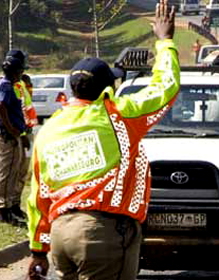
The officers, both in their 30s, were arrested on Tuesday by members of the Organised Crime Unit and Crime Intelligence, and were expected to appear in the Mthatha magistrate’s court on charges relating to bribery and corruption.
Provincial commissioner Lieutenant-General Celiwe Binta said in a statement corruption would be fought from all levels within law enforcement ranks.
“We want to send a strong message to all would-be offenders that we will leave no stone unturned in fighting corruption in the province,” she said. “I also appeal to the communities to report any form of corruption that they come across, including at the provincial roads.”
Reports of bribes and abuse of power relating to traffic offences or officers are not uncommon for Corruption Watch. There are over 200 complaints registered on the NGO’s database with allegations ranging from officers soliciting bribes to motorists having their driver’s licenses confiscated when they refuse to comply with a bribe demand.
In 2012 Corruption Watch launched the “No more tjo-tjo” campaign, which targeted the Johannesburg Metro Police Department (JMPD) in an effort to change some of the department’s policies for officers on the road.
Some of the recommendations by Corruption Watch to JMPD included officers having their names embroidered on their shirts as opposed to removable pins; officers having to introduce themselves when stopping motorists; and having to give their police identity cards to motorists when they are asked, so that the public knows who they are speaking to and if, indeed, they are genuine.
In a follow-up report in 2013, several bribe hotspots around the city were revealed by Corruption Watch. In the reports received, the common complaints were:
- Bribes are solicited from drivers whether they have contravened the law or not;
- If a person refuses to pay a bribe, the officer usually lowers the amount requested;
- If the driver still resists paying a bribe he or she is (a) given a fine, if the law has been broken; (b) allowed to leave without paying the bribe; (c) given a fine in which the officer has fabricated allegations;
- When drivers say they do not have any cash on them, they are asked to go to the nearest ATM and withdraw the money.
Do not give in to bribe requests – consult Corruption Watch’s Know Your Rights card to know exactly what's what when you are stopped by a traffic officer. You can print this card out and stick it to your car dashboard or keep it in your wallet!

